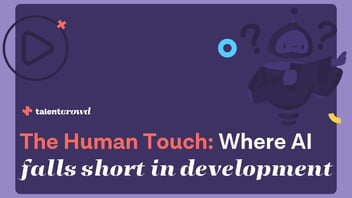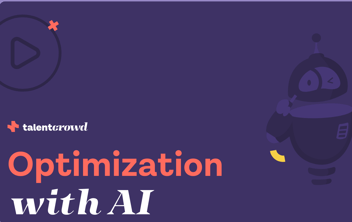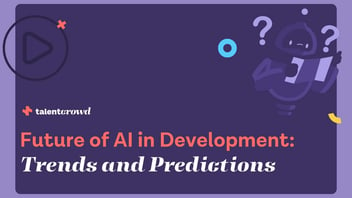As the initial excitement around Artificial Intelligence (AI) begins to settle, it's time to look beyond the hype and focus on its practical, beneficial applications in software development. At Talentcrowd, while we cherish the ingenuity of our developers, we also recognize the significant advantages AI can bring to their work. This blog post delves into the best uses of AI in the software development process, highlighting how it can be a powerful ally rather than a replacement.
1. Automated Testing
Automated testing in software development has been significantly enhanced by AI. Using machine learning, AI tools quickly identify bugs, streamline regression testing, and predict future issues, leading to more robust software. This means faster and more thorough testing, crucial in agile CI/CD environments.
AI's ability to analyze past data enhances the testing process, identifying patterns and potential problems efficiently. However, it's in complex, nuanced testing scenarios where human developers play a crucial role. They bring understanding and insight that AI, for all its analytical prowess, cannot replicate. This human-AI collaboration in automated testing ensures not only comprehensive coverage but also contextual and user-centric testing quality.
2. Code Review and Optimization
In code review and optimization, AI tools stand out as invaluable allies. They bring a new level of efficiency to the painstaking process of scrutinizing code. By leveraging AI, developers can automatically analyze codebases, pinpointing areas for improvement in both efficiency and security. AI-driven code review tools excel in identifying common inefficiencies and potential security flaws, ensuring the code adheres to established best practices.
This automated approach to code review enables a more rapid assessment compared to manual reviews, allowing for quicker iterations and refinements of code. AI tools can sift through vast amounts of code, highlighting issues that might take developers much longer to find.
However, the role of the human developer remains crucial, especially when it comes to understanding the broader context and subtleties of the project. AI can suggest changes, but it lacks the ability to fully comprehend the unique requirements or intentions behind certain coding decisions. Therefore, combining AI's thoroughness with the nuanced understanding of experienced developers leads to more effective and contextually relevant optimizations, ensuring that the code is not only efficient but also aligns perfectly with the project's objectives.
3. Predictive Analytics in Project Management
In project management, AI-driven predictive analytics tools have become a game-changer. They utilize sophisticated data analysis techniques to provide forecasts on project timelines, resource allocations, and possible bottlenecks. This level of foresight is incredibly valuable, allowing project managers to strategize more effectively, allocate resources optimally, and proactively address potential issues before they escalate.
These AI tools analyze historical data and current project metrics to offer predictions, helping managers stay one step ahead. This proactive approach can significantly reduce the risk of project delays and optimize the development process. However, it's important to note that the reliability of these AI predictions depends on the quality and relevance of the data they process. Hence, the integration of accurate and comprehensive data is crucial for the effectiveness of AI in project management.
4. AI in Bug Fixing
AI's role in bug fixing has become increasingly prominent, offering a more efficient approach to maintaining software quality. By employing AI tools in the bug-fixing process, developers can detect, classify, and address bugs in real-time. This rapid response is crucial, especially in large-scale and complex software projects, as it significantly reduces the time taken to identify and resolve issues.
These AI systems are designed to scan through code, employing advanced algorithms to spot anomalies that could lead to bugs. Their ability to continuously monitor and analyze code ensures that many issues are caught early, often before they can have a tangible impact on the end-user experience. This proactive approach to bug detection helps in maintaining a consistently high standard of software quality.
While AI tools are exceptionally efficient at detecting a wide range of bugs, their capability to understand the nuances of more complex, deeply embedded issues is still developing. Certain types of bugs, particularly those that require an understanding of the broader context or the specific intentions behind the code, may still evade AI detection. Therefore, integrating periodic manual reviews by experienced developers is essential. These reviews complement AI's extensive scanning capabilities with human insight, ensuring a comprehensive approach to bug detection and resolution.
5. Personalizing User Experiences
The impact of AI in personalizing user experiences has become a cornerstone in user-centric software development, particularly in fields like e-commerce and content delivery. AI algorithms excel at sifting through large datasets to identify patterns in user behavior and preferences. This analysis enables AI to curate personalized experiences, such as tailored product recommendations, customized content feeds, or adaptive user interfaces, which significantly enhance user engagement and satisfaction.
This customization is not just about selling products or content more effectively; it's about creating a user experience that feels intuitive and responsive to individual needs. Users are more likely to engage with and return to applications that appear to understand their unique preferences and cater to them. In e-commerce, for instance, AI-driven personalization can lead to increased sales and customer loyalty as users encounter more relevant product suggestions and a streamlined shopping experience.
Developers must navigate the delicate balance between offering personalized experiences and respecting user privacy. There's also the risk of creating 'echo chambers' or 'filter bubbles,' where the AI continuously feeds users content based on their existing preferences, potentially limiting exposure to new or diverse content.
Therefore, while AI's role in personalizing user experiences is undeniably beneficial, it requires careful management to ensure that personalization enriches the user experience without compromising privacy or narrowing their worldviews.
Understanding AI's Capabilities and Limitations
AI is not a one-stop solution for all aspects of software development. Its strength lies in handling repetitive, data-intensive tasks with speed and accuracy. However, it falls short in areas requiring creative problem-solving, empathy, and moral judgment – aspects that are still the domain of human developers.
Conclusion
AI in software development is an evolving field with immense potential. At Talentcrowd, we are committed to helping you integrate AI into your development workflow effectively. For more insights and expert guidance, visit our website and subscribe to our channel for ongoing discussions on leveraging AI in software development.
Remember, while AI can significantly enhance various aspects of software development, the creative spark and strategic thinking of human developers remain irreplaceable.
For more information on how to best utilize these tools to aid your expert developers, set up a free consultation with Talentcrowd.




